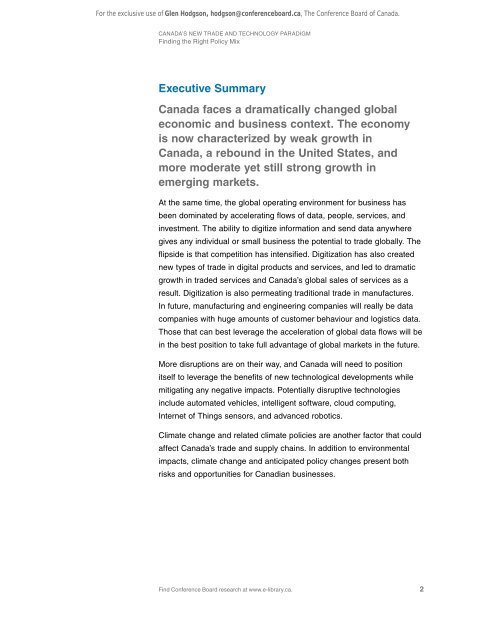Paradigm
8088-canadasnewtrade-en_rpt
8088-canadasnewtrade-en_rpt
You also want an ePaper? Increase the reach of your titles
YUMPU automatically turns print PDFs into web optimized ePapers that Google loves.
For the exclusive use of Glen Hodgson, hodgson@conferenceboard.ca, The Conference Board of Canada.<br />
Canada’s New Trade and Technology <strong>Paradigm</strong><br />
Finding the Right Policy Mix<br />
Executive Summary<br />
Canada faces a dramatically changed global<br />
economic and business context. The economy<br />
is now characterized by weak growth in<br />
Canada, a rebound in the United States, and<br />
more moderate yet still strong growth in<br />
emerging markets.<br />
At the same time, the global operating environment for business has<br />
been dominated by accelerating flows of data, people, services, and<br />
investment. The ability to digitize information and send data anywhere<br />
gives any individual or small business the potential to trade globally. The<br />
flipside is that competition has intensified. Digitization has also created<br />
new types of trade in digital products and services, and led to dramatic<br />
growth in traded services and Canada’s global sales of services as a<br />
result. Digitization is also permeating traditional trade in manufactures.<br />
In future, manufacturing and engineering companies will really be data<br />
companies with huge amounts of customer behaviour and logistics data.<br />
Those that can best leverage the acceleration of global data flows will be<br />
in the best position to take full advantage of global markets in the future.<br />
More disruptions are on their way, and Canada will need to position<br />
itself to leverage the benefits of new technological developments while<br />
mitigating any negative impacts. Potentially disruptive technologies<br />
include automated vehicles, intelligent software, cloud computing,<br />
Internet of Things sensors, and advanced robotics.<br />
Climate change and related climate policies are another factor that could<br />
affect Canada’s trade and supply chains. In addition to environmental<br />
impacts, climate change and anticipated policy changes present both<br />
risks and opportunities for Canadian businesses.<br />
Find Conference Board research at www.e-library.ca.<br />
2


